What could be scarier this Halloween than linear networks eking out their dying gasps as Apple, Disney, and HBO prepare to run train on them with their respective streaming platforms starting tomorrow? It’s the end of an era, folks, and we’re sending it out on a new roster of mediocre pilots—and a few really cool interesting ones! Check out our takes below!
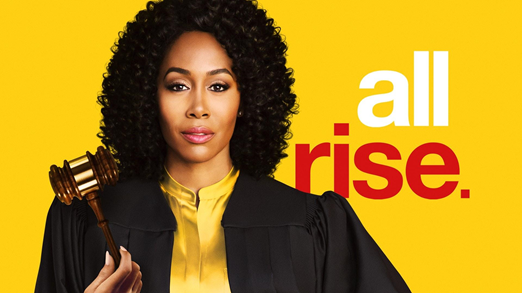
ALL RISE (CBS)
HOW does court work??? In the ever-so titillating world of network courtroom content, I must admit, ALL RISE is at least more entertaining on a baseline level than many of its peers, eschewing dour, self-serious explorations of the trials and tribulations of judges and defenders in lieu of a Ryan Murphy-esque chaotic clusterfuck of jaw-dropping incredulity. Telling the various interlocking stories of the members of a Los Angeles courthouse, we meet Lola Carmichael (Simone Missick), a former prosecutor on her first day on the job as a judge, Deputy District Attorney Mark Callan (Wilson Bethel), Lola’s best friend who she will inevitably end up plowing, public defender Emily Lopez (Jessica Camacho), fighting for the people while in the process of divorcing her abusive husband, and Deputy Sheriff Luke Watkins (J. Alex Brinson), who is currently studying law and makes several, what-I-assume-to-be-illegal suggestions regarding the court cases of his crush Emily. That might all sound pretty milquetoast, but the opening segment of the pilot features a court guard who allows a defendant to be brought in without pants, only to pull a gun and begins screaming about how all the “lowlifes” in prison should be burned to death upon someone suggesting he should have… given the defendant pants… at which point he’s SHOT TO DEATH, NEVER TO BE BROUGHT UP AGAIN. WHAT??? Also incorporating a subplot where a defendant takes Mark to the cleaners while representing himself in court (go off, King), only to be thwarted by Mark convincing him to… trim his beard… which clearly places him at the scene of the crime, and a main plot solved when Luke definitely illegally goes above and beyond his duties as deputy sheriff and cracks open false evidence involving a picture of a shoe, ALL RISE is truly a rollercoaster. I can’t say it’s good, necessarily, as the pilot already more-or-less jumps the shark and the viewer is regularly left to wonder just what the Hell kind of sloppy jalopy circus the courts are hiding behind their intimidating doors, but if you take away all of the screeching bells and whistles, the show hammers home black-and-white instances where cops are bad, verdicts are often incorrect and settled via bargains that have nothing to do with justice, and more women should be involved in the legal field. So, y’know, you could do much worse. [Thomas Seraydarian]
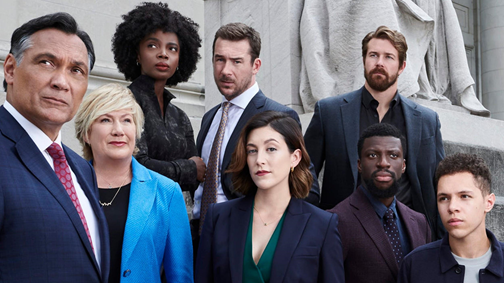
BLUFF CITY LAW (NBC)
NBC’s BLUFF CITY LAW is far closer to the standard formula that’s probably had you, as a presumed millennial, entirely uninterested in engaging with network shows and had the vast majority of middle-aged America religiously tuning in to the boob tube every week. Telling the story of Sydney Strait (Caitlin McGee), a fiery civil rights lawyer, returning to the firm of her estranged father, Elijah (Jimmy Smits), after her mother dies, it’s… a perfectly functional legal drama. Ostensibly somewhat differentiated by the fact it’s set in Memphis, Tennessee (exotic!), although you wouldn’t know it apart from some obligatory shots of bars that have “Memphis” in the title and restaurants advertising soul food, our pilot sees Sydney take on the corrupt chemical conglomerate Amerifarm as they attempt to bury a lawsuit brought against them by the rapidly ailing Edgar Soriano (Mo Gallini), who had contracted cancer after 15 years of using their product. Sydney fights back when it’s appropriate to, takes her lumps and advice from her father when the situation calls for it, has to deal with attempting to thaw out the icy roadblock in her relationship with her ex-husband, and brings home the bacon in the end. Again, it’s fine! Generally well-acted, Caitlin McGee captains her first starring television role commendably, all barely restrained anger and rage at the corruption of the legal system, and Jimmy Smits, who the advertising campaigns at least assume is the one you’re tuning in for, does the Jimmy Smits shtick we know and love. To the advertising campaign’s credit, overall Smits is, in fact, the biggest calling card overall, his gruff, world-weary countenance and delivery a generally charming force, and the relationship between Elijah and Sydney is an inherently fraught one, Sydney having to reconcile the glowing public perception of her father with the realities involving his extra-marital affairs while with her mother. But again, I’m sure you’ve heard it all before: you have way more things to watch than you can possibly imagine, so you probably don’t need to seek out competent, maybe even stellar, network legal dramas unless you have a specific horse in the race. Things get wrapped up with a nice bow, nothing transgressive is done with narrative, technique, or format, and you can do your laundry to it. [Thomas Seraydarian]
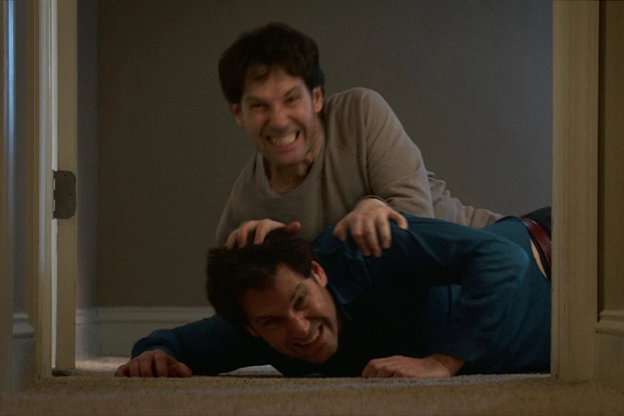
LIVING WITH YOURSELF (Netflix)
After being denied the opportunity to stretch out Thanos’ colon, Paul Rudd has emerged from the Marvel mileu to remind everyone that he’s still the affable schmuck who got famous doing Judd Apatow movies. And just as Apatow’s transitioned from THE 40-YEAR-OLD VIRGIN to THE BIG SICK, Rudd too feels the need to add a layer of depth to his relatable antics. But not everything needs to be that deep. In the case of LIVING WITH YOURSELF, Rudd’s comedic talents are obscured by desperate swings at existential profundity.
The premise has potential: Loser dude tries to jumpstart his life with a mysterious spa treatment, ends up with a clone that’s better at being him than he is. But rather than embrace the ridiculousness of that, we get a lot of silent shots of Paul Rudd and Clone Paul Rudd looking forlorn as they think about just, like, how fuckin’ wild it is that we’re all, like, alive or whatever. It’s not really clear what the deeper meaning is here other than “being alive is nutso.” More disappointingly, it takes time away from the classic clone bit where they tag each other in and out of a social event. More clone shenanigans, less philosophical conundrums. [Dan Blomquist]
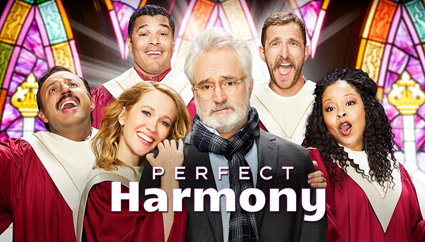
PERFECT HARMONY (NBC)
Fellas… what if the spirit of Dr. Gregory House in a body somewhere between Bill Murray and John Slattery was the lead of a religious, all-grown GLEE set in Kentucky? Does that wet your whistle? Does that rev your engines? People who fit those parameters are the intended audience of PERFECT HARMONY, and I respect Their Minds. More-or-less the JESUS IS KING of network television, PERFECT HARMONY doesn’t suck as much shit as you’d expect, considering the premise, but just feels… a little off. I do have to tip my hat where it’s due and admit that the general concept, if you step back far enough, is fairly admirable in terms of an unapologetic push for dark comedy titillation, at least as far as network is concerned. We open with Arthur Cochran (Bradley Whitford) intending to commit suicide, which is a pretty pearl-grabbing opening in the annals of NBC, only to hear the less-than-dulcet tones of the choir belonging to the Second First Church of the Cumberlands. Arthur then decides the ol’ Highway to Hell is less appealing than waltzing into the nearby House of God and lambasting the choir with the promise that he could help them turn it all around. Hijinks follow, Arthur finds a newfound purpose in life, and you get to hear lots of snarky remarks about classical music, religion, and down-home Kentuckyisms. Lucky us! If anyone deserves credit for their time in PERFECT HARMONY, it’s Whitford, who plays the grouch-with-a-heart-of-gold archetype commendably. But somewhere south of Anna Camp’s gung-ho, if resolutely grating, turn as the cheery choir-lead Ginny is the fact that this is registers as using superficial aesthetic to mask a potentially insidious message. Does PERFECT HARMONY check the boxes of representation and diversity? Yes. But there’s something strange about the fact that the people of color in a gospel choir in Kentucky are continually put in their place by an Ivy League-educated, classically-affiliated, fuddy-duddy white man, especially since Reverend Jax (Rizwan Manji) is continually used for an entirely unfunny, painfully network bit involving what his parents reinterpreted the titles of American movies as so as to impart a lesson upon him, coming across as a convenient court jester rather than a character with any sort of depth or agency. And then there’s the religious aspect. Look… I fully intend to never share my opinion on the aforementioned JIK publicly, but no matter what else you want to say about Kanye’s stab at bringing Jesus back to mainstream entertainment, he at least had challenging production. PERFECT HARMONY does not. [Thomas Seraydarian]
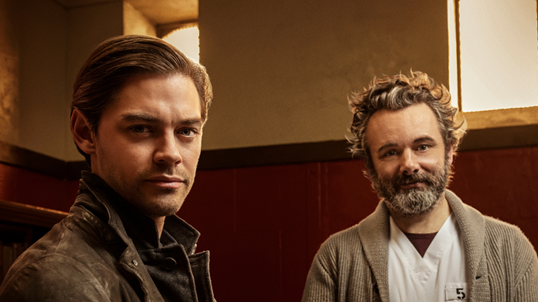
PRODIGAL SON (FOX)
With the success of streaming giant successes such as MINDHUNTER, clearly the best and brightest over at FOX got their thinktank together to come up with something that would scratch that morally ambiguous Hannibal Lecter itch us common masses want, but this time… without David Fincher. Look, to its credit, PRODIGAL SON’s concept is actually pretty entertaining, even if its “twisted” nature is perhaps a bit aggrandized. Malcolm Bright (Tom Payne) is an odd and unpleasant FBI profiler that’s fired for being… odd and unpleasant (and cold-clocking a sheriff in the face after he shoots a serial killer instead of letting Bright speak with him). Approached by NYPD lieutenant and surrogate father, Gil Arroyo (Lou Diamond Phillips), Bright is asked to downshift and act as a consultant for a string of killings that have been plaguing New York’s top brass. Bright identifies the work of the killer as copycat work in honor of “The Surgeon,” who we learn is his father, Dr. Martin Whitly (Michael Sheen). One thing leads to another and Bright ends up needing daddy’s help in bringing the killer to justice. Feeling like an airport paperback thriller that ended up in the paws of network television instead of, well, in all honesty, Netflix, the idea of an estranged father-and-son, serial-killer-and-cop duo having to work through the complex layers of their emotionally torrid past is just enough of a fresh spin that I’m open to the idea on paper. But, while I guess fairly transgressive for the general slate of traditional TV offerings, the tone just doesn’t manage to bring things home. Adopting a very #quirky dark comedy style, it’s hard to figure out who to root for considering a good portion of the pilot is dedicated to humanizing Martin. Look at this horrifying serial killer! Isn’t he clean-cut, charming, and… funny? Why are the writers giving him bona fide cracklers! Why is this a comedy! Malcolm is actually a pretty engaging anti-hero, his struggles with PTSD genuinely impactful and his suicide-ledge lack of care for his own well-being somewhat harrowing, but between the jocular good ol’ boys that are his comrades making cracks about sex and exes and what I’m sure are problematic gray areas involving mental illness and BDSM relationships, PRODIGAL SON ultimately falters. Just watch MINDHUNTER. [Thomas Seraydarian]
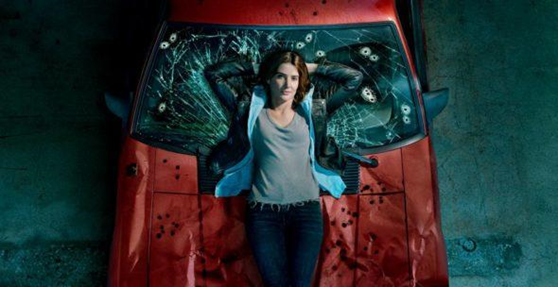
STUMPTOWN (ABC)
In an era where every moderately notable piece of intellectual property is being adapted into a prestige television series, it must really be something knowing your critically acclaimed, cult-followed graphic novel was developed by ABC. But y’know, as far as my deep-dive into 2019 network content has gone this pilot season, I gotta give props to STUMPTOWN for being… perfectly competent! Dex Parios (Cobie Smulders) is an ex-military type trying to juggle managing her PTSD, crippling debt, and taking care of Ansel, her brother with Downs syndrome. Unable to hold down a steady job due to her condition, she ends up roped into the high-octane world of private investigating after she wracks up a nasty gambling debt and agrees to try to track down the runaway granddaughter of the local casino owner, Sue Lynn Blackbird (Tantoo Cardinal). Twists, tricks, and surprise reveals abound! Overall, STUMPTOWN is a nice-enough homegrown mystery-thriller that deserves some props for carrying itself with the air of something that would appear on the services of its more lauded streaming cousins. The overall aesthetic palate is CW-leaning, a network that I’ve always admired for the tonal risks it takes, though nothing will have you clutching your pearls it is certainly hard-nosed, pushing the more family-friendly parameters of ABC, and while not reinventing the wheel, Smulders’ tough-talking, vice-indulging Dex is a lovable anti-heroine that kicks ass first, takes names later, and clearly wears the pants and commandeers the agency in the love-hate casual sex she has with professional rival on the police force, Detective Miles Hoffman (Michael Ealy). Am I entirely sure of how the representation lands in terms of both the Native American and Downs syndrome communities? Not really! Am I qualified to comment on that either way? Hell no! But what I can comment on is that in this era of “Alright, but do I really need to watch it,” I can’t definitively say it’s more worth your valuable time than the 15 other series that have been released in the time it took me to write this blurb, but if this were released in the salad days of middle school when the only entertainment available to me was what was on the boob tube in my dad’s back office, I would have absolutely pushed my parents to let me stay up until 11 every Wednesday to keep up with it. [Thomas Seraydarian]
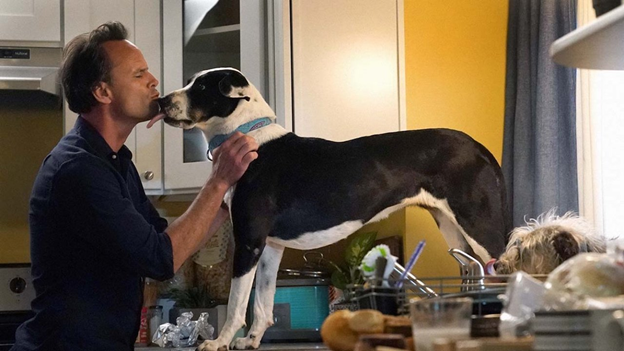
THE UNICORN (CBS)
Having only seen the title and the leading man, I was incredibly excited for Walton Goggins to play a bisexual who has threesomes with scary tattooed couples on OKCupid. That version of the script presumably got killed by CBS, and instead we have a show about a widowed father trying to get back into the dating scene. Not as exciting as my premise, but enough for The Almighty Goggins to work his magic with.
Mr. Goggins, in my humble opinion, has completely fucking murdered every role he’s ever played. I am always happy to see his incredibly large smile. I’m surprised that he chose to squeeze himself into the tiny box of a network sitcom, but I’m not surprised that his Wade Felton is hilarious and lovable and adorable and perfect. Goggins himself was made a widower in 2004, which adds another data point confirming what I’ve dubbed the Reeves Principal: The only good men in Hollywood have suffered unspeakable tragedies.
Beyond Goggins being Goggins, THE UNICORN actually has a number of strong elements. The pair of couples that lovingly nudge Wade out of his grief get ample room to shine; Episode 4’s catfish plot especially highlights the quartet’s talents. The writing delivers dark gut-busters while maintaining an upbeat mood, and we even get some heartstring-tugging scenes about grief and loss. I’m going to end this review now lest I be tempted to type the word “Goggins” again. [Dan Blomquist]
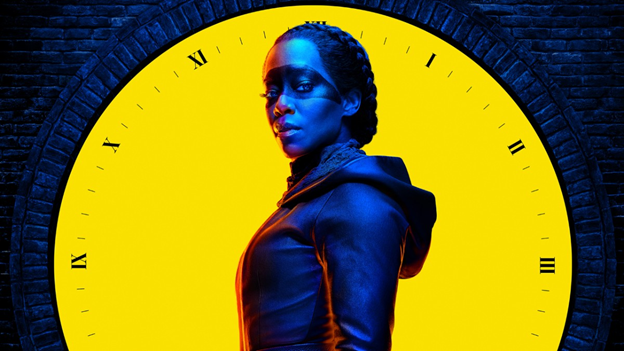
WATCHMEN (HBO)
Everyone can (and should) agree that Watchmen didn’t need to be adapted. It’s too in conversation with its medium (comics, in particular American comics of the ‘70s and ‘80s) and too masterfully plotted and wrapped up in its 12 chapters. It ferrets out, really frantically points at, the clearly fascistic elements of a “superhero,” whether as a weapon of the state, an alt-right vigilante, a sex freak, or a black hole of nihilism. Giving anyone absolute control over right and wrong, or worse, life and death, is never a recipe for anything good and always an exercise in ego and authoritarianism. The bleak truth of Watchmen is that despite the best efforts of its “heroes,” the Aryan tech bro (seriously, who chooses Ozymandias as their name?) was right and anyone with even a shred of redeemable goodness has to live with that or die.
So all that being said, it makes sense that in 2019 we’d see a sequel (side-quel, remix, spiritual successor) to the comic in HBO’s WATCHMEN, ushered to the screen by one of the internet’s perennial pop culture whipping boys, Damon Lindelof. WATCHMEN eschews the national politics and Cold War brinkmanship of the comic while still situating itself in the world it left in its wake. Ozymandias was right that the Cold War would end, but every other national problem has only festered. This is an alternate history where Robert Redford is president, reparations are the law of the land, and police officers hide their identities by wearing masks and dressing up as superheroes. Here WATCHMEN shows its hand. If the comic was about all of the nationalist aspects of the superhero idea because it was being told in the comic format, WATCHMEN the show is about the “TV cop,” an American obsession who upholds the law, but is bizarrely unbeholden to it, who protects the innocent, but largely tortures and jails the innocent as long as they’re not white. By using a real life historic massacre as its opening, WATCHMEN makes it clear that it’s willing to get in the muck of who actually receives justice in America and who actually wields it. But it’s the other narrative and stylistic elements that make WATCHMEN harder to get a handle on.
As the show’s lead, Angela Abar (the always lovely Regina King) is one of the masked cops, the Catholic-themed “Sister Night,” who supposedly retired from the force to open a bakery with her husband, but actually moonlights as a vigilante detective tasked with countering a violent, racist Rorschach-themed militia called the Seventh Kavalry. There’s also a mysterious B-plot about a wealthy aristocrat (Jeremy Irons) writing a play about Dr. Manhattan and an ongoing show-within-the-show called American Hero Story which doubles both as a send-up of the Ryan Murphy FX creations and an interesting way to weave in the backstory of this world’s first heroes. It’s a lot, and the heavily stylized dialogue and production design don’t help. While this show succeeds in feeling at times like a living and breathing comic book (no one quite talks like a human, but they do talk and act exactly like comic book characters), it sometimes gets in the way of the more serious themes the show’s trying to tackle. It makes the show fascinating to watch, but hard to feel like it could ever succeed at digging in like its comic predecessor did. There’s a danger that WATCHMEN could trivialize the real history it weaves into its story or even worse, accidentally support the systems and institutions its intent on criticizing. It’s not quite a reason to write off WATCHMEN yet, but there are numerous reasons to be hesitant. Watching someone walk a tightrope is thrilling, but seeing them fall? Well, it’s often best to look away. [Ian Campbell]




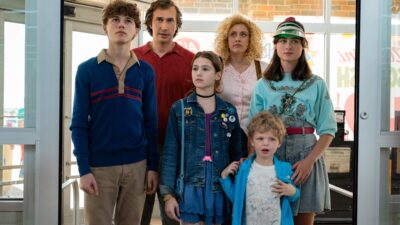





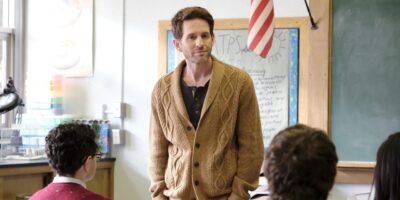
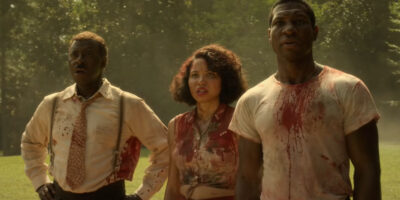




Comments